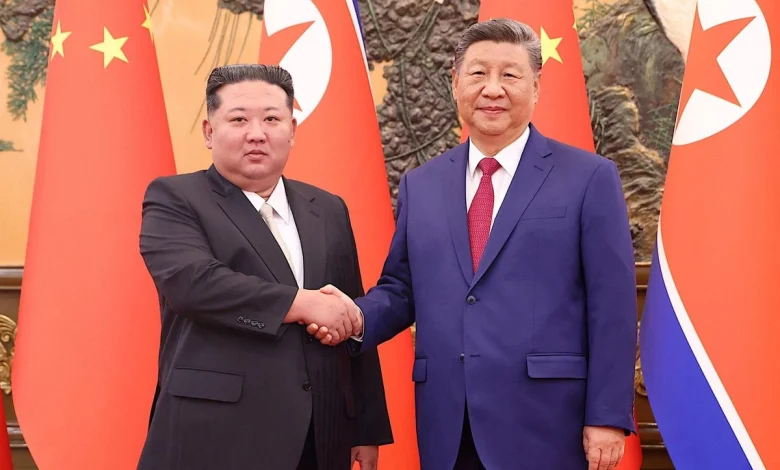
“New World Order,” Experts Warn as China-North Korea Bond Strengthens
The leaders of China and North Korea marked a historic moment at their first formal summit in six years. Chinese President Xi Jinping, North Korean leader Kim Jong Un, and Russian President Vladimir Putin made their first public appearance together during a military parade in Beijing. Their presence represented an emerging bloc of illiberal leaders determined to challenge Western rules. Xi later called to increase coordination with North Korea in global and regional affairs.
The Chinese summit readout showed a most important change from previous meetings between the leaders. The phrase “denuclearization of the Korea Peninsula” did not appear in the document, unlike the past four meetings. China remains North Korea’s primary political and economic supporter. The relationship provides vital support to North Korea’s heavily sanctioned economy, with China handling over 95% of its total trade. China and Russia showed their shared interests earlier. Both countries jointly vetoed a US-led resolution at the United Nations Security Council that proposed additional sanctions on North Korea in 2022.
Xi Jinping meets Kim Jong Un to reaffirm China-North Korea alliance
Chinese President Xi Jinping and North Korean leader Kim Jong Un held their bilateral summit at Beijing’s Great Hall of the People on September 4, 2025, right after the military parade. Xi welcomed Kim with tea and dinner, which highlighted their diplomatic exchange’s importance.
Xi emphasized during their meeting that China and North Korea are “good neighbors, good friends and good comrades bound by shared destiny”. China’s commitment to bilateral relations would “stay unchanged” whatever global developments occurred.
Kim responded by pledging North Korea would “invariably support” China’s efforts to defend its sovereignty, territory and development interests. He backed China’s stance on Taiwan, Tibet, and Xinjiang. Kim told Xi, “China’s celebration is our celebration”.
Kim’s teenage daughter, Kim Ju Ae, reached a milestone by making her first international trip to China during the summit. Kim aimed to strengthen “economic and trade cooperation with China”. North Korea still relies on China for almost all its external trade.
The meeting strengthened the alliance between these Communist nations, and China showed it was willing to accept a nuclear-armed North Korea. This stance challenges Western influence in the region.
Russia joins China and North Korea in trilateral show of strength
Image Source: NBC News
Leaders of China, Russia, and North Korea made history at a Beijing military parade on September 3, 2025. This marked their first joint appearance since the Cold War’s early days, which sent a bold message to Western nations. The parade showcased China’s advanced hypersonic weapons, nuclear-capable missiles, and undersea drones. Thousands of soldiers marched in precise formation.
Kim Jong Un demonstrated his allegiance by pledging “unconditional support” to Vladimir Putin for the Ukraine war. Putin expressed gratitude for North Korea’s contribution of about 11,000 troops to support Russian forces. Kim’s response emphasized his commitment as he promised to do “everything I can to assist” Moscow, calling it a “fraternal duty”.
The display of solidarity came after North Korea and Russia signed their most important military cooperation agreement since 1961 in June 2024. This detailed partnership requires each country to “immediately provide military and other assistance using all available means” if the other faces an armed attack.
EU foreign policy chief Kaja Kallas viewed this gathering as an “autocratic alliance” that challenges the rules-based international order directly. Western officials now label this emerging bloc as an “axis of upheaval” that unites to create an anti-American front.
China avoids denuclearization talk as it reasserts regional influence
Image Source: Council on Foreign Relations
Recent Xi-Kim summit’s absence of denuclearization language marks a dramatic change from previous diplomatic meetings. North Korea’s pledge toward denuclearization and Beijing’s support characterized their four meetings between 2018 and 2019. Current statements from both sides make no mention of a nuclear-free Korean Peninsula.
“It will be hard to expect any visible efforts from China toward North Korea’s denuclearization, as Beijing has increasingly shunned what it sees as an unrealistic goal,” noted Cho Han-bum, a senior researcher at the Korea Institute for National Unification.
South Korean officials maintain China’s commitment to the denuclearization agenda, despite this apparent change. China “has confirmed on multiple occasions that its simple position on Korean Peninsula issues remains unchanged,” according to a Foreign Ministry representative.
China’s strategic calculations have evolved notwithstanding that. Beijing’s North Korea policy traditionally followed three priorities: “no war, no instability, and no nuclear weapons” – in that exact order. Chinese interests would face a direct threat from a unified, US-aligned Korean Peninsula emerging from North Korea’s collapse.
US-China tensions intensified and Beijing moved closer to Pyongyang, which led to near-unconditional support by 2019. This realignment shows China now values regional influence over denuclearization efforts and accepts North Korea’s nuclear status.
China, North Korea, and Russia have shown a new chapter in their international relations through recent diplomatic moves and military displays. Their leaders – Xi Jinping, Kim Jong Un, and Vladimir Putin – made history by appearing together at Beijing’s military parade, marking a watershed moment in global politics. China’s stance has changed dramatically – from questioning North Korea’s nuclear ambitions to accepting its nuclear status and building stronger ties.
This new alliance brings major consequences for Western nations. The diplomatic messages now lack any mention of denuclearization, which points to a fundamental shift in these authoritarian states’ priorities. Western officials have valid concerns about what they call an “axis of upheaval” that challenges the rules-based international order.
Money and power drive these geopolitical moves. North Korea depends heavily on China to survive, with Beijing handling over 95% of Pyongyang’s foreign trade. Russia benefits too, receiving support from about 11,000 North Korean troops for its Ukraine operations. Each country gains strategic advantages through this partnership.
This three-way relationship reshapes power dynamics in East Asia and beyond. South Korean officials stick to their belief that China supports denuclearization despite clear evidence suggesting otherwise. China’s changing policy toward North Korea shows its practical approach – putting regional stability and influence ahead of Western-led denuclearization efforts.
Regional players must see this strategic shift as more than just temporary teamwork. It presents a long-term challenge to Western influence across Asia. These nations have pledged mutual support, and China’s growing military strength was clear during the Beijing parade. The world faces an increasingly divided system where authoritarian regimes unite against democratic alternatives.






